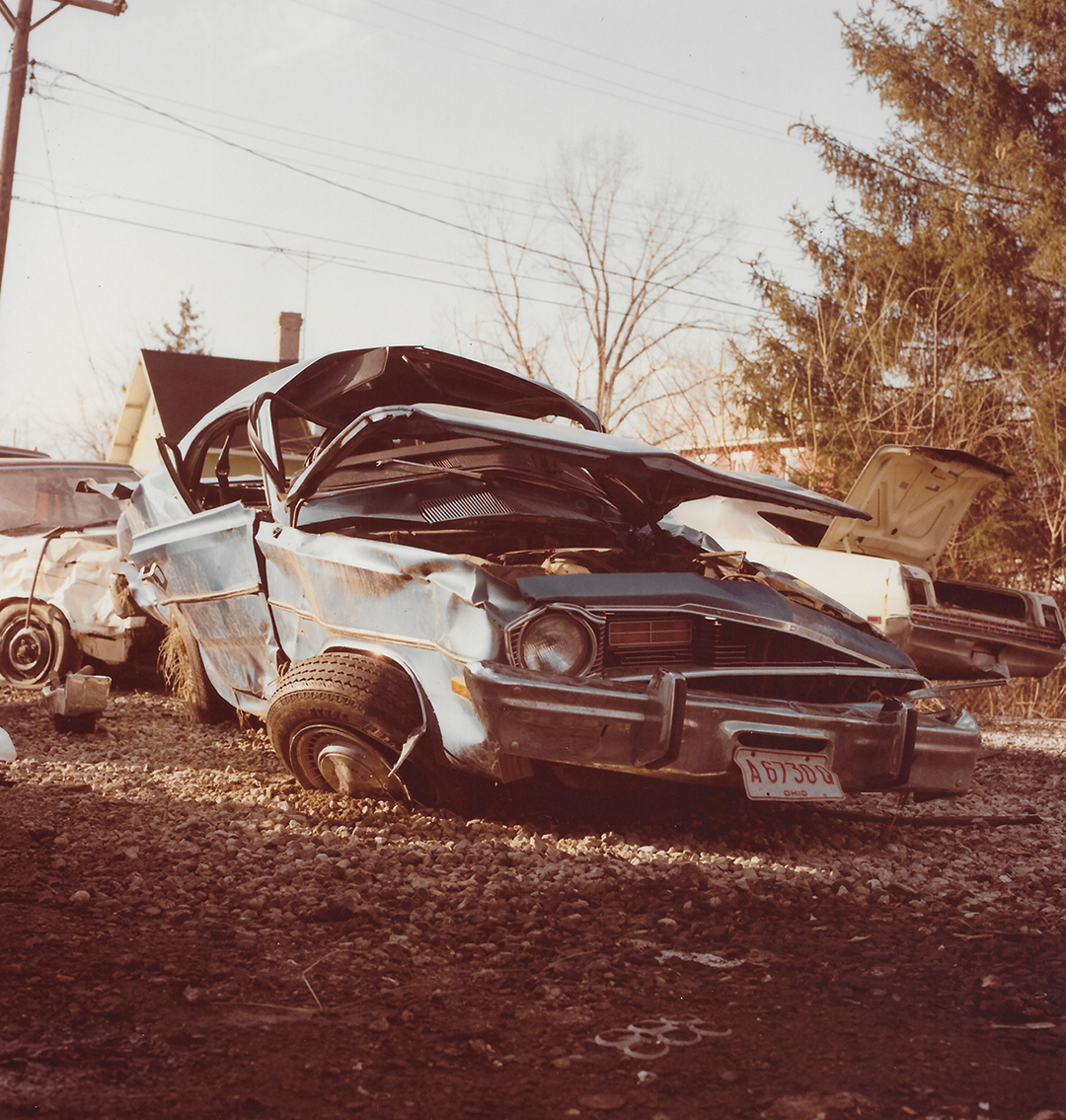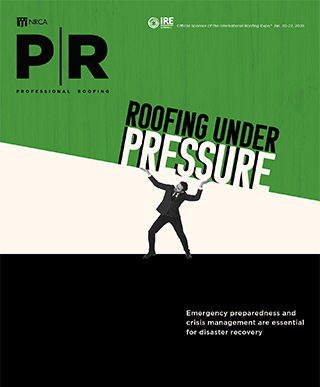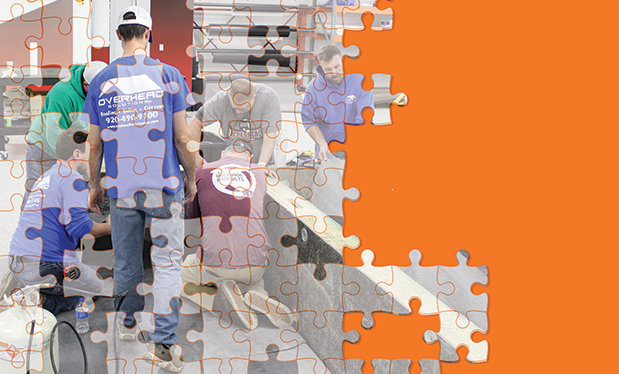
My name is Chad, and I have been working in the roofing industry for the past 10 years. Although I am business development manager for Frost Roofing Inc., Wapakoneta, Ohio, I also am deeply involved in mental health wellness with an emphasis on suicide prevention.
In 2020, the Centers for Disease Control and Prevention found men working in construction have one of the highest suicide rates compared with other industries (a reported 49.4 out of 100,000). To put it into perspective, this rate is four times higher than those not working in construction trades.
But there are things you can do to reduce the possibility of an employee choosing an irreversible route.
Why construction?
Construction is not easy! Most projects depend on the weather, and when what you are or are not going to do on any given day is beyond your control, stress creeps in. Another stressor can be the team (or lack thereof). Almost all roofing companies struggle to find employees at a time when demand for work has increased. This places more stress and pressure on the employees who do show up.

Another issue that comes into play is feeling obligated to perform when injured. As a recovering addict, I can tell you addicts always go into “self-medication” with the mindset we are only going to medicate until an injury heals and it will only be for a few days. In reality, it rarely works out this way.
When opiates are prescribed to one of your employees, strongly encourage the employee to have someone else involved to ensure only what has been prescribed is taken. I almost destroyed my marriage and relationships with my children before I made the decision to get clean.
Over time, these types of stressors add up, and some people begin to lose hope. What should you look for if you believe someone is struggling? A person who may be thinking about suicide will:
- Talk about suicide
- Be increasingly tardy and/or absent
- Withdraw from friends and family
- Seek means to take his or her life
- Exhibit severe mood swings or personality changes
- Practice self-harm (intentional cuts, burns, etc.)
- Engage in risky or self-destructive behavior
- Increase use and/or abuse of drugs and alcohol
- Change routines
- Give away things of value (typically to someone who will cherish the items)
It is a common reaction to see these warning signs and tell yourself the person must be going through a phase or something private and decide to let the person “work it out.” But we need to stop this line of thinking and stop making assumptions and instead start asking questions.
We have reached a point where people do not know how to talk to each other anymore. We have accepted using email, texting or instant messaging as substitutes for real interaction. But taking the time to go out to job sites and ask your team members how they are doing is important. They will feel they matter, and we all need to feel that more now than ever before.
How do I approach someone?
When you see someone struggling, approach them with compassion. So often we ask questions based on our current situations and fail to take the time to consider a person might be struggling with so much more.
For instance, lead with “what” questions such as, “What can I do to help?” or “What do we need to do to get through this?” By doing so, you are exhibiting concern and support. Sometimes, just letting someone know they matter is all it takes to help get them back on track.
Other people might require more work. Most times, you will not get an honest answer the first time you ask how someone is doing. It takes a tough person to make it in the construction trades. Most workers believe it is a weakness to ask for help, so you may have to ask multiple times before they admit they are struggling. Be a persistent light in their life. You may be the only one they have.
Do your best to stay away from asking “why.” Most people in distress have racked their brains trying to figure out why they are in a particular situation, and you asking them “why” might throw them into a larger spiral. Instead, ask: “What can I do to help?” or “What can we do to get through this?”
The hardest question
When having these conversations, you must be willing to ask: “Are you thinking about taking your own life?”
Every time I tell someone this, the panicked response is: “OK, but what if they say yes?” Great question! Understand it is not your job to fix anyone. It is your job to ask questions and help any way you can. If a person says they are thinking about taking their life, it is your responsibility to be a bridge and get them help by taking them to a nearby hospital.
The hospital staff will do whatever they can to help. There may be certain medications emergency room workers can administer or a prescription to help stabilize the person. It is important to note roofing workers often think it is a weakness to take medication for something they are struggling with mentally or emotionally. These are the same people who want pain meds when something hurts physically. But they (and you) must understand an emotional break can have a much longer healing time than a physical one. It is important to stay ahead of these situations the best we can.
For articles related to this topic, see “Know the risks,” May 2020 issue and “Coming out of the dark,” July 2017 issue.
How to give support
If someone lets you know they are experiencing difficult thoughts and feelings, it’s normal to not know what to do or say. But you do not need special training to show support. Sometimes, just being present is all a person needs. It’s usually the small things that matter most. Here are some examples:
- Listen. Simply let the person talk without passing judgment. If they are unwilling to talk, explain you will be there when they are ready.
- Offer reassurance. Let them know they’re not alone. Seeking help can feel lonely and sometimes scary.
- Stay calm. Even if their thoughts or situation upsets you, try to stay calm. This will allow them to stay calm and open up to you.
- Be patient. Don’t ask for too many details, and allow them to determine the pace at which they share their feelings and seek support.
- Try not to make assumptions. Your perspective will be different from theirs. Try not to assume what is causing them pain or what will help.
- Keep in contact. Part of the emotional support you offer could be to keep things as normal as possible. Involve them in social events and take the time to talk about other parts of your lives.
You can:
- Be patient
- Offer emotional support and reassurance
- Provide resources when they’re ready (for example, you could show them how to speak to someone in management or seek professional help)
- Make sure you don’t become unwell yourself
You can’t:
- Force someone to talk to you. It can take time.
- Force someone to get help (unless it is an emergency situation)
- See a doctor for someone else
It’s difficult to see someone struggle, but taking the time to say something and offer support could make a world of difference. If someone has communicated they are suicidal or has taken steps to prepare for it, do not hesitate to get them help. This would be considered an emergency and an opportunity to save a life.
My story
Dec. 7, 1979, was a Friday. We were living in West Milton, Ohio, on our way to see my grandmother who lived in Saint Marys, Ohio. We were about halfway there when a lady rushing to the airport to pick up her son blasted through a stop sign and hit our car.
My stepdad died upon impact. It is believed I was sitting in my mother’s lap, and she followed me through the windshield just as the car started to flip over. The flip slammed me on the road and my mom to the roadside. I am told the car rolled over me and crushed me. When paramedics arrived, my mother kept telling them she had two sons. I was in the middle of the road, but where was my brother, Todd? As the investigation continued, they found my brother under my stepdad in the floorboard of the rear seat in the 1974 Plymouth Duster.
My mother held on until she made it to the hospital but died soon after her arrival. The doctors initially thought there was no real chance of me living through the night. But after several hours, the doctors told my family that if I was willing to fight, they were going to fight with me. They took me into surgery and began setting bones, but I drifted off into a coma. The medical staff suggested my family talk to me about things I had done and places I had been. They wanted to get my brain active. It must have worked! Six weeks later, I left the hospital having no idea what life had in store for me.

Todd also survived, and we went to live with our dad and stepmother in what would prove to be an abusive household. It started with phrases such as “you’re worthless” and “you will never amount to anything” or “you should have died in the wreck with your mother.”
However, as I began to grow and become stronger, so did the level of intensity in the abuse. One cold, snowy night, my stepmother burst into my bedroom in a rage. She pulled me out of bed, pushed me out the sliding glass door in the snow and slid the door shut. I was only in my underwear. I heard Todd come running as she was pulling the door closed, begging her to let me in. For interrupting her, Todd was forced to sit in a chair and watch me. It did not take long for me to get really cold and start crying. Todd screamed at me to go get help. Finally, I did.
I ran next door. Our neighbor, Lance, answered the door and allowed me to come into his house. I can still recall how much it hurt to stand over a kerosene heater trying to let my body recover from the cold. The neighbor wanted to call the police, and I begged him not to. I was so afraid to lose my dad. My dad was my world! After I was warm and had Lance’s sweatpants, sweatshirt and socks on I began to relax. I walked out and tapped on our bedroom window and went back inside.
Life began speeding up quickly. Todd turned 18 and moved out. Soon after, I did, too. When I turned 18, I received a check from my parents’ life insurance policy. I thought I was going to be rich for the rest of my life. Life was good!
But the following year, things took a turn. On Feb. 22, 1994, I received a phone call from my best friend, Seth. The conversation started off much like every other conversation I had with him. We joked and bantered back and forth. He then took on a more serious tone. He told me he started dating a girl, but she had gone back to her ex-boyfriend. I told him I was sorry to hear that. He then told me he was going to kill himself.
There was a long pause on the phone. I was half waiting for him to tell me he was joking. My gut reaction was to try my best to scare him into not doing this. Honestly, at this point I do not think I believed him. We say a lot of dumb things when we are young. I’m 48 and still say a lot of dumb things.
However, as he continued to talk, I realized he was serious. He told me his grandmother was in heaven; he’d done everything he wanted to do here; and it was time for him to move on. This is when I knew I had to act. We spoke for maybe 30 more seconds. My brain entered panic mode. Seth told me he loved me, and he hung up the phone.
My first reaction was to call 911. But the moment I grabbed the phone, two thoughts started creeping in. First, I wondered: What if I get him in trouble? Instantly, I visualized Seth being led out of his mom’s house in handcuffs. I know it sounds stupid, but it is what my 18-year-old mind envisioned. The second thought was I did not want him to be mad at me. He was my best friend, and I didn’t want to cause him issues. So I threw the phone down and made the decision that if I could get to him, I could fix this. I was certain that with my fast car and luck on my side, I could save the day.
During the drive, I made plans to hug him, slap him or scream some sense into him. I roleplayed those plans over and over in my head until I pulled into the driveway. As soon as I did, I looked up and noticed he had taped newspapers over the garage door windows.
Seth had told me he would leave a key under the doormat. I do not recall grabbing the key or opening the door. My next memory is me bursting through his front door. The moment I cleared his doorway, everything went into slow motion. “The Donahue Show” was playing on the TV, and a cigar was burning in an ashtray. In our conversation, Seth had mentioned he was enjoying his last cigar.

I was confident I made it there in time. The cigar was still smoking! As I rounded the corner to go from the dining room to the kitchen, I saw a letter taped to the garage door and felt a huge burst of adrenaline. As I pulled the door open, it was as though someone punched me in the stomach. I ran into the garage and grabbed Seth, picked him up and realized I could hardly breathe. I could hear myself screaming, but my body was completely numb.
At that moment, it was as if I awoke from a dream. Seth had covered his face with a bandana so I would not have to see him. I realized he was gone. I released him, grabbed the phone and called 911.
The saddest part of this experience is so many of us have similar stories. No matter how often I describe this moment, I still fight back emotions.
Seth is why I started my company Upshift with Chad to help prevent more lives from being lost. There are resources available; there are appropriate ways to ask questions and help people through the process. This all goes back to the saying: “See something, say something, do something.”
If you see someone struggling, ask them what you can do to help. Once they have opened up to you, do whatever it takes to get them the help needed. Do not let them out of your sight. I would much rather that person be upset with you for being persistent than for you to have to be their pallbearer.
Resources
Suicide and crisis
988 Suicide & Crisis Lifeline
988lifeline.org
Helpline: 988
Crisis Text Line: Text HELLO to 741741
Suicide prevention
National Institute of Mental Health
nimh.nih.gov/health/topics/suicide-prevention
The Construction Industry Alliance for Suicide Prevention
preventconstructionsuicide.com
Substance abuse and mental health
Substance Abuse and Mental Health Services Administration
(800) 662-HELP
CHAD DUNLAP is business development manager for Frost Roofing Inc., Wapakoneta, Ohio.



